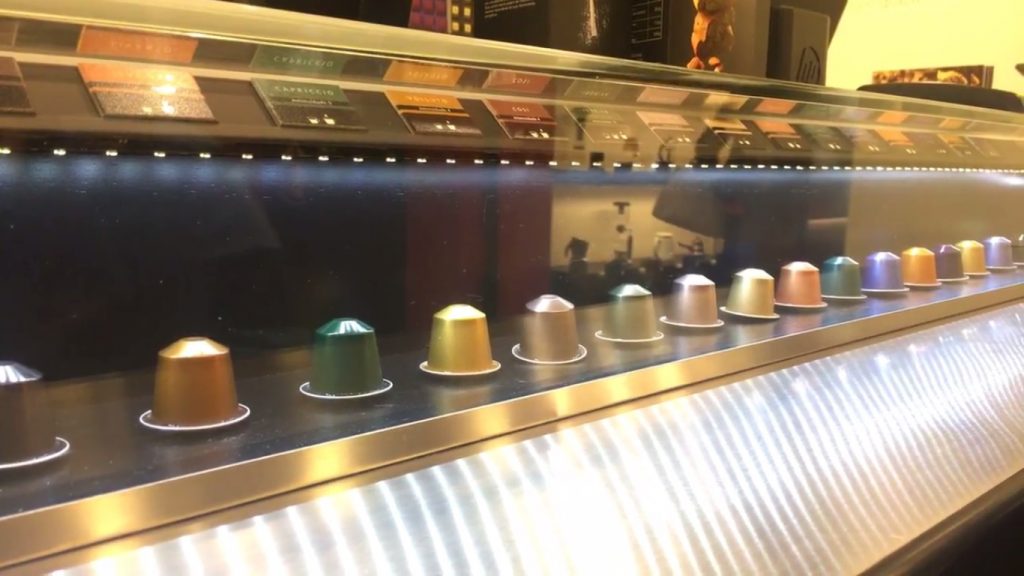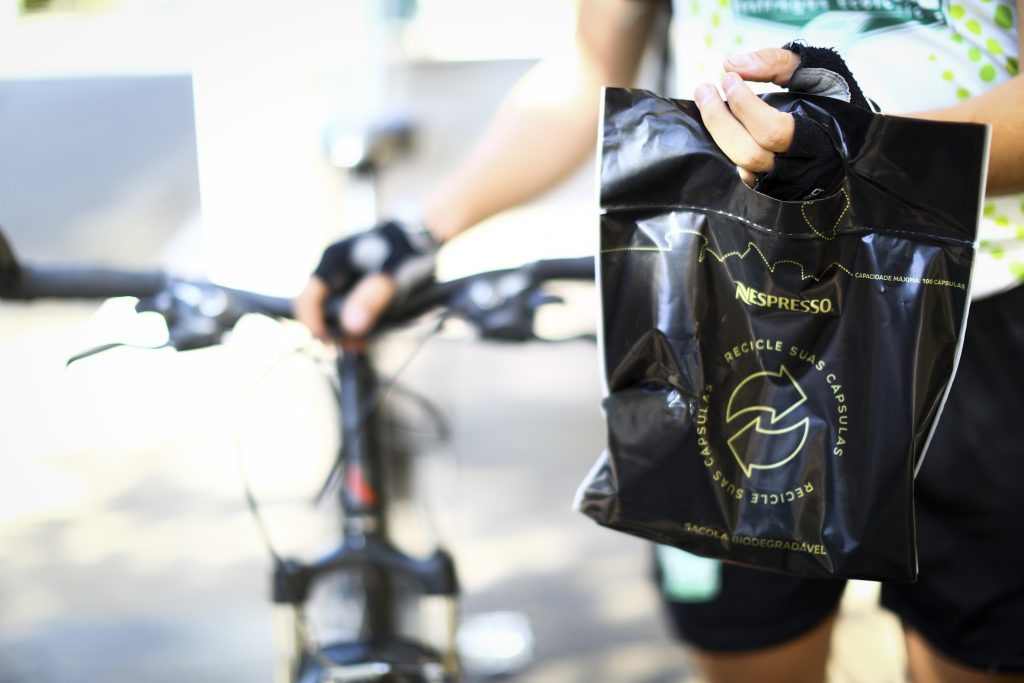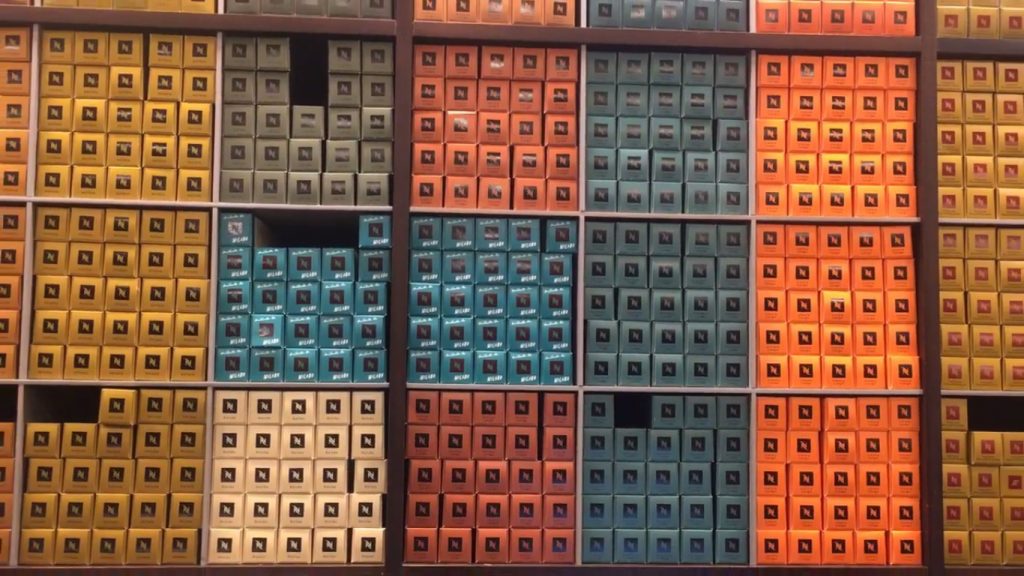Information is everything. Admittedly, having a coffee in a capsule at home is very practical.
But the consumer has to know that this whole commodity has a price to pay: it is not yet sustainable. At least in Brazil.
But some things can lessen the guilt. One is that the consumer who has an old Nespresso machine, can switch to a newer one for special conditions.

“Nespresso machines have long durability, but if the customer wants to change, we evaluate their previous machine and offer special conditions for the next machine”, says Cláudia, who recently included Sustainability in her role towards responsibilities.
Nespresso has a recycling center in Barueri, whose main function is to recycle the coffee capsules. That’s where all the Nespresso logistics intelligence is placed in Brazil.
We use aluminum capsules for two reasons: it is the only known material that keeps the coffee fresh and because it is infinitely recyclable. We took the aluminum and the coffee powder from the capsule. We use reverse logistics in order to be able to collect these capsules. We ship, in a truck, the machines, capsules and accessories that are going to be sold. A part of this truck was prepared to receive the used capsules. In this way, we take advantage of transportation and also reduce our carbon footprint, says Cláudia.

To transport the garbage in Brazilian territory, it is necessary to issue invoices. This reverse policy is made in 32 points of Nespresso Capsules Collection in Brazil, with 23 boutiques and the other partner stores that make the collection. All of this material comes to Barueri for recycling.
Controversy of capsules in Germany
In Germany, 100% of the capsules are recycled by the government. In the city of Hamburg, individual containers were banned from public buildings, including water bottles, napkins, detergent containers and coffee capsules, among other items. “No one mentioned the Nespresso brand or any determination in that direction, but when the press published the ban, a photo of a Nespresso capsule was used. For this reason, some people thought it had something to do with our capsules. I just wanted to point out that we started to recycle our capsules in Germany in 1993, through the government recycling system, which is the Duales System Deutschand”, she explains.
Cláudia stresses that since the capsules were launched in Brazil in 2006, Nespresso kept those capsules that were sent spontaneously by its clients.

(Nespresso Returnable Capsules)
“We did not have a recycling plant here. We went after the Government, cooperatives, associations, around the world, explaining that we wanted to recycle our capsules and they were not interested. They just wanted to know about the profit from the aluminum, since we are the biggest aluminum recyclers in the world. Thus, we developed our own recycling center in different directions: whether in reverse logistics, where we create the equipment to separate the aluminum and the coffee from the capsule, and then find out what to do with the used coffee”, she says.
A company that makes fertilizer, called Visafértil, accepted to receive the coffee powder to be used in its compound. The aluminum is sent to another company where it is recycled.
Collection Points
In Brazil, Nespresso has 32 collection points that, according to the company, makes them reach 60% of their consumers, since most of them are concentrated in São Paulo and Rio de Janeiro.
The vast majority of our customers go to stores frequently, they can and should take the used capsules to be recycled. We deliver a biodegradable bag to anyone who wants to participate in our recycling program. The client can bring the capsule as they wish, provided they are Nespresso capsules”, she explains.
The other issue is the professional capsule, which is also recyclable. “We have 150 client companies where we collect capsules frequently. I already know that these companies use a certain volume and as we deliver the new capsules, we take the ones that have already been used. It is nothing more than a reverse logistics system, we use an electric car in the collection process, with zero emission of pollutants”, she says proudly.
Another service that Nespresso started in 2013 was the quick delivery of spare capsules by bicycle. Currently, we perform this service in 50 and 29 districts in São Paulo and Rio de Janeiro, respectively.
The customer orders the capsules online and, if the order is made until 12:00 p.m., the capsules are delivered in the same day. The delivery man is trained to ask the customer for the used capsules for recycling.

(Same Day Delivery: bike that delivers on the day you request)
The customer can also use the technical assistance services for recycling. If the company cannot solve the problem through the phone, it sends a technician to do the home repair. In any of these cases, it is possible to deliver the used capsules for recycling.
Unfortunately, today, in Brazil, only 2% of the waste is recycled. “Unfortunately, we still do not have the recycling culture present in Brazil”, she laments.
Nespresso’s target is to reach the level in which it can recycle 60% of the capsules.
The Aluminum
Company’s commitment to 2020 is to have a 100% responsible aluminum management, which involves recycling and extraction. We have brought together companies in charge of aluminum and NGOs such as WWF and UCN to measure the environmental impact extent in the aluminum extraction, how to offset and create procurement standards to be sustainable. We have a lot to look from the supply chain and other previous processes. We founded the ASI (Aluminum Stewardship Initiative), a union of several companies in the world to have a standard”, she says
Another concern is the climate changes. Any activity within a company generates carbon. So, we observed the whole chain, from coffee production to aluminum recycling, and we saw the impact each process has on CO 2 emissions and we have two goals: the first one is to minimize the carbon footprint. The process that most generate emissions are the coffee production in the farm (due to the nitrogen cycle in the respiration of plants), and the coffee production in the Nespresso machine.

(Same Day Delivery Capsule Collection Bag: Recycle your capsules!)
That is why we are trying to make the machines more and more sustainable. The second goal is to neutralize the carbon. We want until 2020 to be a 100% neutral company in the whole chain. We call this movement the positive cup, because when we drink a Nespresso cup, we do not just drink quality coffee, but we are also drinking a coffee that is good to the environment”, she says.
Finally, Nespresso is committed to this neutralization process, of planting four million trees in the world, in different regions. In this project, we are working in conjunction with the Pur Project ( www.purproject.com). They helped us in this calculation. After the native forest, the coffee stand is what most conserves the environment around. We engage with the producer so he understands that he is part of a unique community where everyone needs to play their part for a better future for our planet, she concludes.

(Varieties of coffees in Nespresso capsule)
Traceability
Nespresso has 100% traceability of the entire chain, working through traders that do the marketing, intermediating all the procedures for the coffee in order for it to arrive in the factory in Switzerland. “We pay between 30 and 40% more than the normal coffee price on the market. We are not talking about an isolated bag that is sold at a very high price, but rather a continuous volume at a price that is very attractive to the producer. The difference is our people staying there the whole year.



